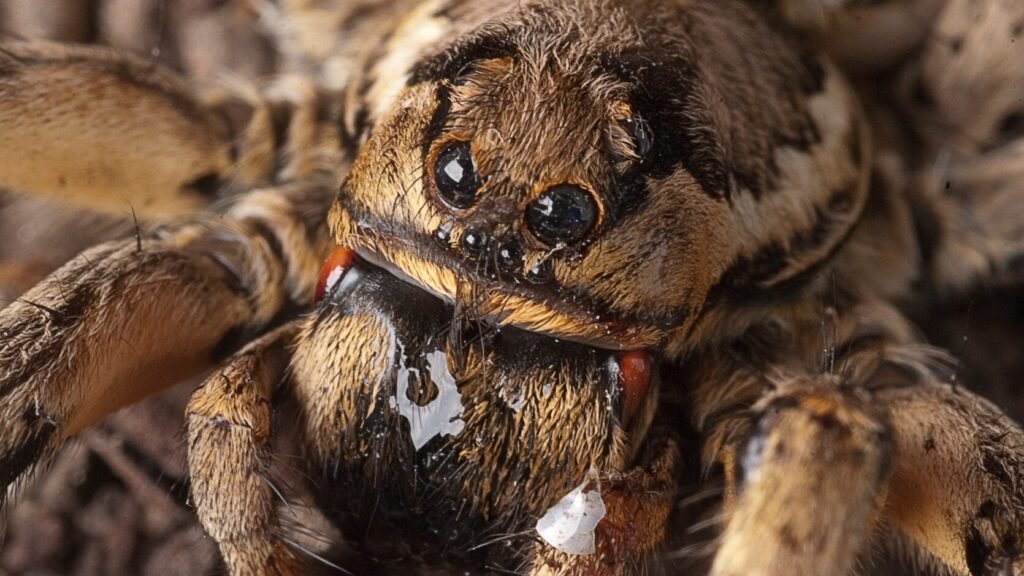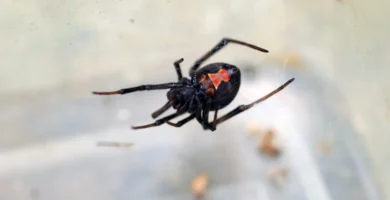
Wolf spiders can be both fascinating and frightening. These agile arachnids, known for their hunting prowess and distinctive appearance, often find their way into homes, causing concern and sometimes fear. If you’ve ever encountered a wolf spider in your house, you know they can be unsettling. In this guide, we’ll explore everything you need to know about wolf spiders as pests, how to handle them, and the best strategies for effective pest control. Let’s dive in!
Table of Contents
Understanding Wolf Spiders as Household Pests
Wolf spiders are large, robust spiders belonging to the family Lycosidae. They are called “wolf spiders” because of their hunting style, which resembles that of wolves. Unlike many other spiders that spin webs to catch prey, wolf spiders actively hunt their food. They have excellent vision, with large eyes that help them spot their prey from a distance.
These spiders come in various sizes and colors, often ranging from brown to gray. They are known for their hairy bodies and long legs. The most common species you might encounter in the U.S. include the Carolina wolf spider, the rabid wolf spider, and the giant wolf spider.
Why Wolf Spiders Become Household Pests
Wolf spiders are solitary creatures that prefer to stay out of sight. However, their natural habitat can sometimes overlap with human dwellings. They are attracted to homes for a few reasons:
- Shelter: Wolf spiders seek shelter from the elements and predators. Homes, especially those with cluttered basements or garages, offer perfect hiding spots.
- Food Supply: These spiders are attracted to homes because they provide a steady supply of other insects, such as flies, cockroaches, and ants, which are their primary food sources.
- Warmth: During colder months, wolf spiders may seek the warmth of indoor environments to stay comfortable.
Identifying Wolf Spiders in Your House
Spotting a wolf spider in your home can be tricky, especially if you’re unfamiliar with their appearance. Here’s what to look for:
- Size: Wolf spiders can vary in size, but they are generally larger than many other house spiders, with leg spans ranging from 1 to 2 inches.
- Appearance: They have a robust, hairy body and long legs. Their coloration can range from brown to gray, often with stripes or patterns on their bodies.
- Movement: Unlike spiders that use webs, wolf spiders are fast movers and often scurry across floors or walls.
- Webs: You won’t find the typical spider webs with wolf spiders. They create small burrows or hide under debris.
The Risks and Concerns of Wolf Spiders
Are Wolf Spiders Poisonous?
Wolf spiders are venomous, but their venom is not typically harmful to humans. The venom is used to subdue their prey, and while it can cause a reaction in humans, it’s rarely serious. The bite might cause some mild symptoms like redness, itching, and minor swelling, similar to a bee sting.
How Dangerous Are Wolf Spiders to Humans?
In general, wolf spiders are not dangerous to humans. Their bites can be uncomfortable, but they do not pose a significant health risk. However, if you or someone in your household experiences severe symptoms such as excessive swelling, fever, or an allergic reaction, it’s important to seek medical attention.
Common Misconceptions About Wolf Spider Bites
There are several myths about wolf spider bites that can cause unnecessary panic:
-
Myth: Wolf spider bites are as dangerous as those of black widows or brown recluses.
- Fact: Wolf spiders are not as dangerous as these more notorious spiders. Their venom is less toxic and usually only causes mild discomfort.
-
Myth: Wolf spider bites can cause long-term health issues.
- Fact: Most wolf spider bites heal within a few days with no long-term effects.
Effective Pest Control for Wolf Spiders
How to Get Rid of a Wolf Spider?
If you’ve spotted a wolf spider in your home, here are some effective methods to address the problem:
- Manual Removal: If you’re comfortable, you can use a vacuum cleaner to remove the spider from your home. Make sure to dispose of the vacuum bag or empty the canister outside immediately.
- Use of Traps: Sticky traps placed around areas where wolf spiders are commonly seen can help catch and monitor their presence.
- Chemical Treatments: There are spider sprays available that can help eliminate wolf spiders. Be sure to follow the instructions carefully and consider using these in conjunction with other methods.
- Professional Extermination: For a more serious infestation, hiring a pest control professional may be necessary. They have access to stronger treatments and can address the problem more effectively.
Professional Extermination vs. DIY Methods
When deciding between professional extermination and DIY methods, consider the following:
- Extent of Infestation: If you’re dealing with a large number of wolf spiders, a professional might be your best bet. DIY methods are more suited for smaller, isolated incidents.
- Safety: Professionals use industrial-grade pesticides and have the expertise to apply them safely. DIY methods involve less toxic options but may not be as effective.
- Cost: DIY methods are usually less expensive, but they might require ongoing effort. Professional services have a higher upfront cost but often result in a more thorough solution.
Key Strategies for Wolf Spider Extermination
Here are some essential strategies for effective wolf spider extermination:
- Eliminate Hiding Spots: Clear clutter from your home, especially in basements, garages, and other areas where spiders may hide.
- Seal Entry Points: Close gaps around windows, doors, and other entry points to prevent spiders from entering.
- Reduce Food Sources: Keep your home free of other insects that serve as prey for wolf spiders. Regular cleaning and proper food storage can help with this.
- Maintain a Clean Environment: Regular vacuuming and dusting can help remove spiders and their egg sacs from your home.
Preventing Wolf Spider Infestations
How to Keep Wolf Spiders Away?
Prevention is key to keeping wolf spiders out of your home. Here are some tips:
- Regular Cleaning: Keep your home clean and free of clutter. Regular vacuuming helps remove spiders and their webs.
- Proper Storage: Store firewood and other outdoor materials away from your home and off the ground.
- Use Spider Repellents: Natural repellents like essential oils (e.g., peppermint oil) can be used to deter spiders.
Home Maintenance Tips to Prevent Spider Infestations
Proper home maintenance can greatly reduce the likelihood of spider infestations:
- Fix Leaks: Ensure there are no leaks in your home, as spiders may be attracted to damp areas.
- Seal Cracks: Seal cracks in walls, floors, and foundations to prevent spiders from entering.
- Trim Vegetation: Keep plants and shrubs trimmed away from your home’s exterior to reduce spider access.
The Role of Pest Control Experts in Preventing Wolf Spiders
Pest control professionals play a crucial role in preventing spider infestations:
- Inspection: They can conduct thorough inspections to identify potential entry points and problem areas.
- Treatment: Professionals use targeted treatments to address current infestations and prevent future ones.
- Advice: They provide advice on home maintenance and prevention strategies to keep your home spider-free.
Other common spider pests in the U.S.
2 August, 2024

Pest Control for Brown Recluse Spiders
2 August, 2024

Pest Control for Black Widow Spiders
Frequently Asked Questions About Wolf Spiders
Does Hair Spray Kill Wolf Spiders?
Hair spray is not a reliable method for killing wolf spiders. While it might temporarily immobilize the spider by making its legs sticky and impairing its movement, hair spray does not address the root of the problem or effectively eliminate the spider. Additionally, hair spray does not kill the spider instantly; it merely incapacitates it. For effective control, consider using dedicated spider sprays specifically formulated to kill spiders or consult with a professional pest control service. These professionals can identify the extent of the infestation and implement more effective and lasting solutions.
Can Wolf Spiders Climb Up Walls?
Yes, wolf spiders can climb walls. They are equipped with strong legs and tiny claws that allow them to grip various surfaces, including walls. This climbing ability enables them to reach areas that are not immediately visible, such as behind furniture, in corners, and even ceilings. Their mobility and agility make it easier for them to hunt for prey and find hiding spots in homes. To mitigate this, ensure that your home is sealed properly, with no gaps or cracks in walls, windows, and doors that might allow spiders to enter.
How to Identify a Wolf Spider Bite?
Identifying a wolf spider bite can be challenging, as the symptoms may be similar to those of other spider bites. A wolf spider bite typically causes localized redness, itching, and mild swelling. Unlike some other spiders, wolf spiders do not possess venom that is dangerous to humans, so their bites are generally not serious. However, if you experience severe symptoms such as intense pain, significant swelling, muscle cramps, or any signs of an allergic reaction, it is crucial to seek medical attention promptly. Keeping the bite area clean and applying a cold compress can help alleviate mild symptoms.
Are There Natural Remedies for Wolf Spider Control?
Yes, natural remedies can help deter wolf spiders. Some effective natural methods include:
Essential Oils: Oils such as peppermint, eucalyptus, and tea tree oil are known for their spider-repellent properties. Mix a few drops of these oils with water and spray around your home, focusing on entry points and common hiding spots.
Vinegar: A mixture of vinegar and water can be used as a spray to repel spiders. The strong odor of vinegar is unappealing to spiders and can deter them from entering treated areas.
Diatomaceous Earth: This natural powder is effective in killing spiders and other insects by damaging their exoskeletons. Sprinkle diatomaceous earth around your home, particularly in areas where spiders are likely to enter or hide.
Maintaining Cleanliness: Keeping your home clean and free of clutter reduces the number of hiding spots for spiders and their prey, making your home less attractive to them.
What Attracts Wolf Spiders to Homes?
Wolf spiders are attracted to homes for several reasons:
Food: The presence of other insects, which wolf spiders prey on, can attract them to your home. Ensuring that your home is free of insects can help reduce the attraction.
Shelter: Cluttered or undisturbed areas provide ideal hiding spots for wolf spiders. Regularly cleaning and decluttering your home, especially in basements, attics, and garages, can make it less appealing to these spiders.
Warmth: Homes offer a warm environment, especially during colder months. Spiders seek out warmth to survive, so they are more likely to enter homes during fall and winter.
How Effective Are Spider Repellents Against Wolf Spiders?
Spider repellents can be effective in deterring wolf spiders, but their effectiveness varies based on the type of repellent used and the specific conditions of your home. Natural repellents, such as essential oils and vinegar, may need to be reapplied regularly to maintain their effectiveness. Commercial repellents and insecticides often provide longer-lasting results and can be more potent. It’s important to follow the manufacturer’s instructions when using any repellent to ensure safety and effectiveness. For severe infestations, professional pest control services may offer the most reliable solution.
Can Wolf Spiders Damage Property?
Wolf spiders do not cause significant damage to property. Unlike termites or rodents, they do not chew on materials or consume household items. Their primary interest in homes is to find food (other insects) and shelter. While their presence can be unsettling, they do not pose a structural threat to your property. However, maintaining a clean and clutter-free home can help prevent them from taking up residence and reduce the chances of encountering them.
For more information on pest control for other household pests, consult reputable sources such as the Centers for Disease Control and Prevention (CDC) and local pest control professionals.
